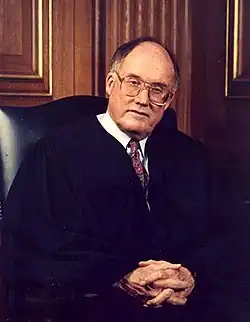User:Noname65432/Florida v. Wells
Background
An issue arose on a night time highway patrol by a local highway officer in Florida when an individual we will call Wells, his last name, was pulled over and booked for a DUI. Florida Highway patrol pulled over the respondent Wells for speeding before noticing alcohol on his breath. Wells was then checked for a DUI and marijuana was found in the vehicle as well upon the police search. The officer then began to inform Wells that after his failure to pass the DUI test his vehicle would be impounded until further notice. This resulted in Wells pleading to a nolo contendere charge resulting in his arrest. The officer found the marijuana only after impounding the vehicle when Wells was arrested which is the incident that began to lead to the problems talked about below in this article. The main points that will be driven home through this case and article are the importance of the fourth amendment as well as where police officers need to draw the line when it comes to suspect privacy and protocol.
Argument
As previously stated, the issue began to arise in the situation when it was uncovered how exactly the marijuana was discovered by the police. The central issue before the U.S. Supreme Court was whether opening a locked container found during an inventory search is permissible under the Fourth Amendment when no standardized agency policy governs such action. This created an opening for the defendant, Wells, to attempt to combat the charges in order to reduce the punishment that he was going to receive for the entire incident that took place on the day he was stopped.

Decision
On April 18, 1990 the Supreme Court ruled that the Florida Supreme Court was correct in their decision meaning that the evidence used in the charges was "insufficiently regulated" meaning that it violates the fourth amendment however they did also say that an all or nothing policy would still be in place allowing officers to use their discretion based on the appearance of the case in the future. This decision leaves the parameters of the fourth amendment as well as how much power officers have in the field in somewhat of a grey area however one could argue that is how all law should be since nothing is truly ever black and white.
Opinions
The majority opinion held by those of the court was that the search violated the fourth amendment which should come as no surprise considering this was the end ruling after deliberation was completed. It was difficult to find the opinions of those who did not agree with the verdict but there were those among the court who did not share the views of the masses for example justices Blackmun and Stevens both did not agree and filed separate concurring opinions disagreeing with the ruling. Though this does just go to show that not all will agree most of the time when it comes to matters of the law, the overall sentiment in the court was that justice was served regarding Wells' possession charges that were given in tandem with the DUI charges.
_03.jpg)
References
- ^ Rogers, Brent A. (1991–1992). "Florida v. Wells: The Supreme Court Bypasses an Opportunity to Protect Motorists from Abuses of Police Discretion". Iowa Law Review. 77: 347.
- ^ Carter, Yancy A. (1990). "Florida v. Wells Could Possibly Be Putting Fourth Amendment Rights on a Runaway Train". Southern University Law Review. 17: 353.